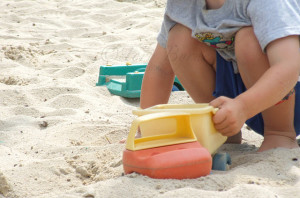by Kimberly Allen, DC, DACCP – ICPA.org:
Having fun with your child is important, but good play routines can last a lifetime.
It is a parent’s responsibility to stimulate their child’s developing nervous system with every motion and activity. These motions are helpful in developing neurological pathways. Parents also need to remember that although “educational” video games have been developed for babies up to young adults, they do not stimulate the same neural pathways in the brain as active play activities. Play activities should include stimulation of all five senses (sight, touch, sound, smell, and taste). The following are some different play activities you can use to incorporate neurological development techniques into your child’s daily routine.
• Visual (sight): Tossing beanbags, blowing bubbles, taking photos with a camera, dancing with scarves or movement with different colored scarves for the infant, using both hands to draw shapes and letters or to hold objects, and tracing letters or numbers on a person’s back and having them traced upon own back.
• Tactile (touch): Different textures (smooth, rough, uneven), splashing water in a bathtub, building blocks, examining natural objects such as feathers and pinecones, petting and feeding animals, eating snacks with different textures, hugging, and manipulating small objects such as Legos, puzzles, and lacing beads.
• Auditory (sound): Dancing or moving to music, humming, musical chairs, beating rhythm on instruments, singing sounds where words need to be added (“Old McDonald had a …” Or “B-I-N-G-O”), and jumping rope while chanting or singing.
• Smells and Tastes: Introduce the child to different smells and tastes and look for appropriate reaction. For example, a sour face in response to a sour taste. Have the child name different smells such as coffee, fruits, and perfumes.
• Vestibular (equilibrium/balance): Spinning in circles, balancing on a teeter-totter, jumping on a bed, climbing on jungle gyms, sliding down a slide, walking on uneven surfaces (sand, grass), crawling through small spaces, allowing child to reach with right hand across the body to any object on the left and vice versa, and also tummy time for infants.
• Proprioceptive (sense stimuli): Pushing and pulling toys or wagon; tumbling to the ground; pillow fights; playing catch with a ball; kneading dough; getting in or out of seatbelts, jackets, boots, shoes, and socks; playing horsy; stretching up to the sky; obstacle courses; and pouring water or sand from one container to the next.
These activities are excellent sources of play techniques that will stimulate the development of your child’s neural pathways. Please remember that even though play is important, safety is more important. Some activities may cause injuries similar to that of Shaken Baby Syndrome.
Shaken Baby Syndrome was originally referred to as a “whiplash” injury. Shaken Baby Syndrome occurs when a child is shaken violently in a to-andfro fashion. Such violence can cause hematomas (bruising) in the area between the skull and the brain, retinal hemorrhaging (bleeding in the eyes), and, less commonly, fractures to the skull.
Though most people feel that Shaken Baby Syndrome occurs only as an act of violence, it can also occur during play activities that were never meant to harm. These activities include:
• Repeated and vigorous tossing of a child into the air. This allows a “whipping” motion of the head and neck.
• Jogging with infant on back or shoulders. Just because the infant is in a carrying restraint does not mean that head is supported in a neutral position.
• Bouncing the child on knee or swaying the leg back and forth, creating a to-and-fro motion and a “whipping” motion of the head and neck.
• Swinging child around by ankles. The child will attempt to move head against force of motion. This can cause “whipping” of the head and neck.
• Spinning child around in circles. The child’s head will feel very heavy and will often fall backwards, causing the “whipping” motion.
Signs and/or symptoms of brain stem swelling (e.g. Shaken Baby Syndrome) include: constant crying, stiffness, inability to wake up or sleeping more than usual, and vomiting. If you see any of these symptoms in your infant or child after any play or injury, take them to their doctor immediately. Please use caution at all times in order to best protect your infant or child from such injuries.
Just remember, having fun is important, but good play routines can last a lifetime.
Article originally posted at
Posted on Categories WellnessLeave a comment on Playing to Develop Healthy Minds and Bodies
by Rae Pica – ICPA: The stories I hear from parents never cease to amaze me. Like the one from the mom who was feeling pressured to enroll her two-and-a-half-year-old in the local soccer program—the local, competitive soccer program! “Our town,” she said, “is very much into pushing children to compete and succeed. And I know other parents are looking at me as though I’m failing my child, but I’m not going to give in to the pressure. Good for her! Whether it’s a fear that their children won’t get into the college of their choice, will never find their passions, or will become lazy and unmotivated if they aren’t constantly engaged in organized activities, too many of today’s parents are responsible for their children being overscheduled with no time just to be. What happens when a child’s time is scheduled and programmed—directed by someone else—from morning ‘til night, day after day? One mother wrote to me, “If the parents work a full day and the children are in a traditional school, the child goes to care before school at around 7:30 AM, then goes to school, then goes to after-school care until around 5:30 PM. Then they have two hours of homework. If you add in one sport per season, they have two hours of practice or games once or twice a week. So the child’s ‘workday’ is more than twelve hours!” In addition to the stress it causes, an over-scheduled, over-programmed life at an early age assures the child will never be able to entertain herself; she will never be able to live inside her own head; she will not be able to deal with solitude or quiet time. She may not get much of it as an adult, but for her sake I hope there will be some. And when there is, it would be awfully sad if she felt panicked at the idea of having to keep herself amused and therefore felt she absolutely had to be in the company of others. If parents want their children to grow up to be resourceful, they have to make sure their kids start practicing now. That means they have to ensure their children have plenty of unstructured time, preferably in big, uninterrupted chunks of time. Rebecca Isbell, early childhood educator and author, says that the chunks of time children need for uninterrupted play will vary according to their level of development. Toddlers, she maintains, require a minimum of 30 minutes to remain in play activities that interest them. Preschoolers need 45 to 60 minutes. And early elementary children who are focused on their play may need an hour or more to bring their work to a conclusion. Here are some questions excerpted from my book, A Running Start: • If children begin living like adults in childhood, what will they have to look forward to? Let’s rethink the values of unstructured, creative playtime compared with the all-too-common, scheduled and over-structured activities we have been led to believe are so beneficial. Article originally posted at ICPA.org. submitted by jwithrow. Journal of a Wayward Philosopher December 17, 2014 The S&P opened at $1,972 today. Gold is back down to $1,198 per ounce. Oil is down to $56 per barrel. Bitcoin is down to $322 per BTC, and the 10-year Treasury rate opened at 2.08% today. Both oil and the 10-year rate are closing out 2014 at price levels much lower than most analysts anticipated which sets up for an interesting 2015. Will crude prices remain at current levels and put the squeeze on the U.S. Shale revolution? Will interest rates remain low and complicit in enabling the Treasury to service the $18 trillion national debt without much fuss? We shall see. As for the S&P, it has been 6 and a half years since it experienced a correction of 10% or more. But markets cannot go in one direction forever – that 10% correction is coming. I have seen some predictions of a major 10%-plus correction sometime in the spring of 2015. It may be more like 50% if the correction is coupled with the fiat monetary crisis that is on the horizon but I think we may still be a few years away from that one. Instead, it is more likely that a major stock market correction will spur the Fed into QE4. Either way, it is advisable to be very vigilant if you have money in the equity markets. Shifting gears, I have been thinking quite a bit about child-rearing given the arrival of Maddie Lynn eight weeks ago. I have come to the conclusion that our culture today has become much too rigid and regimented when it comes to raising children in our fast-paced modern world. School days have gotten longer, homework loads have increased tremendously, grades are now emphasized heavily, standardized testing has been implemented and enforced across the board, the number of adult-organized activities for kids have exploded and, as a result, childhood stress, worry, and fear have increased dramatically. Studies conducted by Jean M. Twenge at San Diego State University suggest that youth anxiety and depression have been trending higher rather sharply over the last fifty years. Perhaps more troubling, Twenge’s research suggests a shift in motivation amongst kids from intrinsic to extrinsic values; kids now tend to be more motivated by popularity and money than self-acceptance, moral character, and community. The reason for this shift is rather clear to me: American childhood is now more about meeting adult expectations and less about personal growth and development. Observe the parents at a youth sporting event and see if this statement isn’t true. Now the parents mean well, don’t get me wrong. But too often they think their child’s future depends exclusively upon performance in school, performance in athletics, performance in extra-curricular activities, or some other external measurement of performance so these things are all pushed on kids to the point where their own interests and talents are subordinated. Studies by Peter Gray show that childhood free time has been declining steadily since the 1950’s including a decrease in free play as well as time spent talking to others at home. Meanwhile, time spent on homework has increased 145%. The government school system equates more homework with more learning. In reality, homework serves only to replace students’ individual interests with the Department of Education’s mandated curriculum. At best students memorize the mandated curriculum long enough to pass the standardized test and then they let it go. At worst they think the curriculum is useful and they retain it at the expense of pursuing their own passion. The truth is memorization is not learning; it is a waste of time and energy. Real learning can only occur when the individual has an interest in the topic and is free to explore that topic in his or her own way. Children need to be free to make mistakes, analyze those mistakes, and then attempt to correct the mistakes. Instead, the current model of education teaches children that they will be judged and punished if they make a mistake so students learn to fear mistakes above all else. This mentality has the potential to set them up for a very restricted adulthood in which they shy away from opportunities for fear of making a mistake. Ultimately we need to ask ourselves what is truly important for our children. This will be different for each family and that should be embraced, not ridiculed. There is no reason to think everyone must adopt the same parenting style or that every child must receive the same education. In fact, a free society requires diversity and the sharing of unique ideas in order to thrive. So what’s really important for our children? Good grades and getting into a good college? This looks like an outdated model to me – it is exclusively designed to produce good employees. But we are moving away from a ‘jobs’ based economy and the availability of traditional full time employment with comprehensive benefit packages will continue to diminish over the coming years and decades. Becoming a superior athlete? My observations suggest that youth athletics are much more important to the adults – school employees, coaches, parents – than they are to the kids. Too often youth sports are a chore rather than a joy. Participating in as many extra-curricular activities as possible? Again, these are often more important to the adults than the kids. Children should certainly be free to participate in whatever groups or activities interest them but too often they are pushed in the adult’s favored direction instead of their own. I am convinced that a childhood free to grow and develop in a unique way is the most important gift parents can give their children. I think children need more guidance and less teaching; they should be encouraged to discover and pursue their own passions and interests without the pressure of forceful expectations. Pair this method with sound financial education and an IBC insurance policy that has been capitalized for 18 years and I think you have the makings of a creative, self-driven adult capable of thriving in a rapidly changing world. Of course these are just this philosopher’s humble opinions. Joe Withrow For more of Joe’s thoughts on the “Great Reset” and the Infinite Banking Concept please read “The Individual is Rising” which is available at http://www.theindividualisrising.com/. The book is also available on Amazon in both paperback and Kindle editions.Let the Children Be Children

I’m not enrolling her in all these programs at age two.”
• How can we ensure our children won’t be burned out from all the pushing and pressure before they’ve even reached puberty?
• If we’ve caused them to miss the magic of childhood, what will kids later draw upon to cope with the trials and tribulations of adulthood?
• What will become of the childlike nature adults call on when they need reminding of the delight found in simple things—when they need to bring out the playfulness that makes life worth living?
• What joy will our children find as adults if striving to “succeed” becomes life’s sole purpose?Raising Children in the Modern World

Raising Children in the Modern World
Hot Springs, VA
Wayward Philosopher



